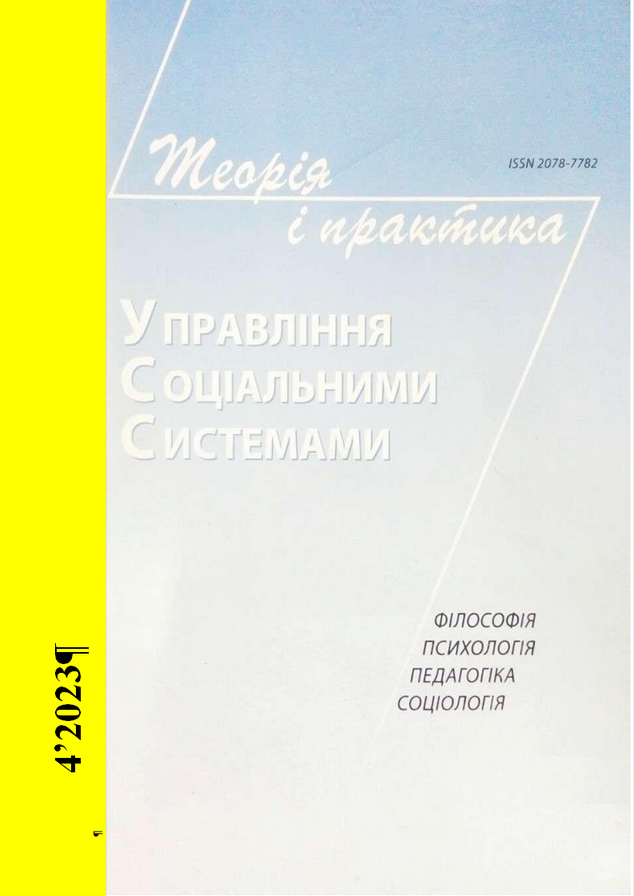КОМУНІКАЦІЯ ЯК ОСНОВА УСПІШНОЇ РЕАЛІЗАЦІЇ ПАРТНЕРСЬКОЇ ВЗАЄМОДІЇ У ПЕДАГОГІЧНІЙ ДІЯЛЬНОСТІ В УМОВАХ ДИСТАНЦІЙНОГО НАВЧАННЯ
DOI:
https://doi.org/10.20998/2078-7782.2023.4.03Ключові слова:
партнерська взаємодія, педагогічна діяльність, комунікація, дистанційне навчанняАнотація
Анотація: стаття присвячена аналізу процесу комунікації як основи успішної реалізації партнерської взаємодії у педагогічній діяльності в умовах дистанційного навчання. Проаналізовано теоретичні аспекти комунікаційного процесу, до яких було віднесено: розуміння ролі учасників комунікаційного процесу, засоби комунікації (мовні, невербальні, письмові), психологічні особливості комунікації в освіті. Досліджено специфіку партнерської взаємодії в освітньому процесі в умовах дистанційного навчання. Визначено основні структурні компоненти партнерської взаємодії: учасники, мета, ресурси, стратегія, комунікація, взаємодія та співпраця, оцінка. Визначено напрями, якими комунікація забезпечує успішність реалізації партнерської взаємодії, серед них: формування та підтримка відносин довіри, координація дій, розв'язання конфліктів, розвиток метакогнітивних навичок, підтримка мотивації та взаємодії.
Посилання
Aprileva, I. (2021), “Social-pedagogical partnership in illuminating the day, basic ideas”, Theory and methods of training and development, is. 51, pp. 7 – 17
Vision of future development and science of Ukraine. available at: https://mon.gov.ua/ua/viziya (Date of application: August,25,2023)
Vorozhbit-Gorbatyuk, V. (2021), “Competence of pedagogical partnership as a basis for the quality of higher pedagogical education”, Juveniles and market, is. 10. p. 196
Efimova, O., Zhitska, S., Himai, N., Braevska, A. (2021). “Intercultural commu-nication in the minds of globalization processes in the development of the modern world”, Scientific Collection “InterConf”, is. 42, pp. 343 – 348
Kulakovska, T. (2020), “Effective communication between the student and the teacher is the key to success in learning”, 2nd All-Ukrainian Scientific and Methodological Conference Ensuring the Quality of Higher Education. Odesa, p. 205.
Lysetska, O. (2020), “The authority of the teacher in higher education as the basis of the quality of student education”, Editorial Board, p. 166.
Petrishina, O. (2020), “Formation of language tolerance of the future teacher-linguist in the conditions of war”, ІV International scientific-practical conference. Ternopil: Vector, pp. 356 – 361
Podbutska, N., Knysh, A., Bohdan, J., Chebakova Y. (2020), “Commu-nicative properties of psychology students inclined to leadership”, Problems of Modern Psychology. no. 3, pp. 48 – 57
Romanovskyi, O. [et all.] (2019), “Factors of development and directions of improvement of distance learning in the system of higher education of Ukraine” – [electronic resource]. Information technolo-gies and means of education: electronic scientific professional edition. no. 6. vol. 74, pp. 20 – 42
Skrypnyk, T., Martynchuk, O., Suprun, H., Kryvakovska, R. (2022), “Featu-res of partnership between specialists of educational institutions and parents of a child with special educational needs”, Scientific Perspectives. no. 6(24), pp. 514 – 526
Tovkanets, G., Lendel, L. (2019), “Prosodic features of socio-pedagogical communication”, Bulletin of the National University Chernigiv Collegium named after TG Shevchenko. Series: Pedagogical Sciences, (1), pp. 229 – 232.
Tolochko, S. (2021), “Digital competence of teachers in the context of digitalisation of educational institutions and distance learning”, Bulletin of the National University “Chernihiv Collegium” named after T. Shevchenko”. no. 13(169), pp. 28 – 35.
Pidbutska, N., Knysh, A., Bogdan, Zh., Chebakova, Yu. (2021), “Com-munication power of students-psychologists, who are up to leadership”, Problems of modern psychology, 3, pp. 48–57
Fichten, C., Olenik-Shemesh, D., Asuncion, J., Jorgensen, M., Colwell, C. (2020), “Higher education, information and communication technologies and students with disabilities: An overview of the current situation”, Improving accessible digital practices in higher education, pp. 21 – 44.
##submission.downloads##
Опубліковано
Номер
Розділ
Ліцензія
Авторське право (c) 2023 Юлія Чебакова, Дарина Нагла

Ця робота ліцензується відповідно до Creative Commons Attribution-NonCommercial-NoDerivatives 4.0 International License.
Автори, які публікуються у цьому журналі, погоджуються з наступними умовами:- Автори залишають за собою право на авторство своєї роботи та передають журналу право першої публікації цієї роботи на умовах ліцензії Creative Commons Attribution License, котра дозволяє іншим особам вільно розповсюджувати опубліковану роботу з обов'язковим посиланням на авторів оригінальної роботи та першу публікацію роботи у цьому журналі.Автори, які публікуються у цьому журналі, погоджуються з наступними умовами:

